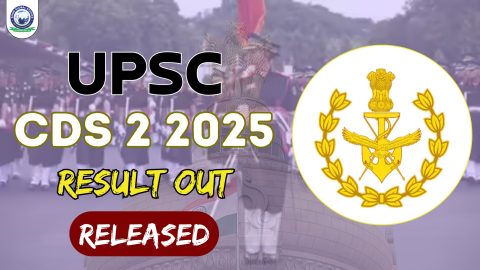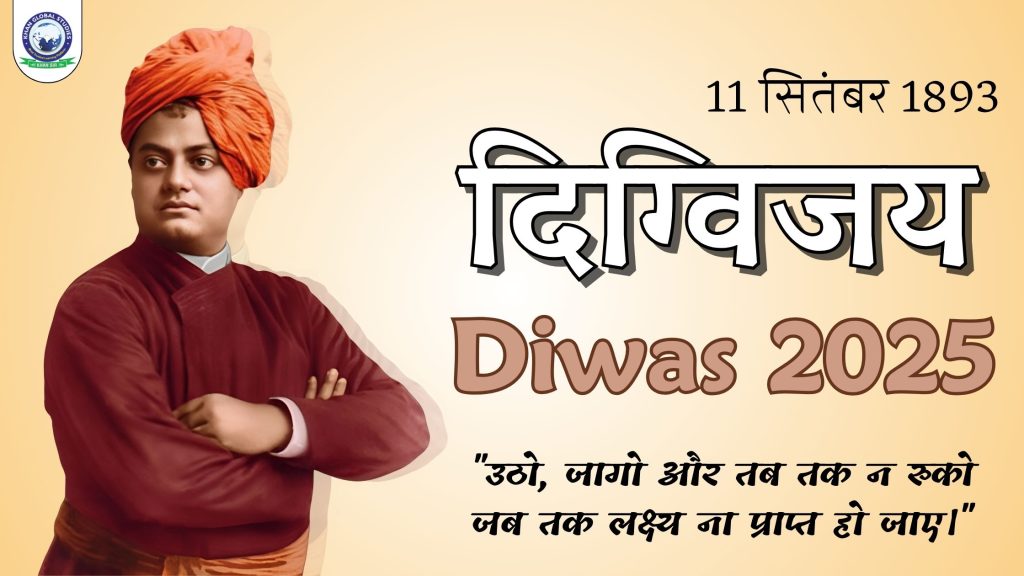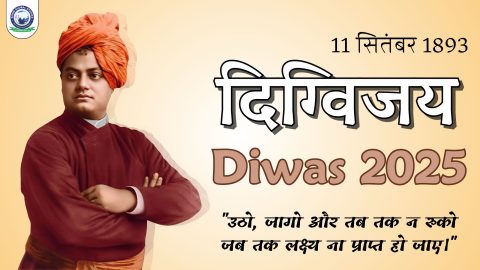Digvijay Diwas is observed on September 11, commemorating the day in 1893 when Swami Vivekananda delivered his iconic speech at the World’s Parliament of Religions in Chicago. The event marks India’s cultural and spiritual triumph, with Vivekananda representing Hinduism and Indian heritage to global delegates. His words, “Sisters and Brothers of America,” received a standing ovation and left an indelible imprint on the world’s understanding of India’s values.
This day is also known as Universal Brotherhood Day, because Vivekananda’s speech emphasized religious tolerance, global harmony, and the unity of all human beings. Educational institutions, NGOs, and spiritual organizations across India conduct events to uphold these principles.
Historical Background
The roots of Digvijay Diwas lie in the historic address delivered by Swami Vivekananda on September 11, 1893, at the Parliament of the World’s Religions in Chicago. Vivekananda’s opening salutation bridged the East and West, introducing Vedanta Philosophy with its ideals of inclusiveness and respect for all religions.
Through his speech, he denounced sectarianism and fanaticism and called for a universal approach to spiritual truth. Vivekananda quoted the Bhagavad Gita, stating, “Whosoever comes to Me through whatsoever form, I reach him; all men are struggling through paths which in the end lead to Me,” conveying the essence of Hindu tolerance and acceptance.
India’s representation at this global forum reshaped global perceptions, showcasing its philosophical and spiritual richness. The ripple effect of this moment led to an intellectual and social renaissance in India and recognition abroad.
Importance of Digvijay Diwas
Digvijay Diwas is far more than a commemorative event—it is a day that:
- Observes the triumph of Indian philosophy and spirituality on a global platform, fostering national pride and international respect.
- Promotes ideals of universal brotherhood and harmony, crucial in today’s interconnected and often divided world.
- Inspires youth with the principles of self-development, service, courage, and moral strength as emphasized by Vivekananda.
- Encourages reflection and dialogue on religious tolerance and the unity of humanity, which remain deeply relevant.
- Motivates learning and application of Vivekananda’s teachings for individual and national development.
Famous Quotes by Swami Vivekananda
Swami Vivekananda’s words during and beyond his Chicago address resonate even today. Some of his most influential quotes include:
- “Arise! Awake! And stop not until the goal is reached.”
- “You have to grow from the inside out. None can teach you, none can make you spiritual.”
- “Never think there is anything impossible for the soul. It is the greatest heresy to think so. If there is sin, this is the only sin; to say that you are weak, or others are weak.”
- “Ask nothing; want nothing in return. Give what you have to give; it will come back to you, but do not think of that now.”
- “Sectarianism, bigotry, and its horrible descendant, fanaticism, have long possessed this beautiful earth.”
- “Be not afraid of anything. You will do marvellous work. It is fearlessness that brings heaven even in a moment.”
- “Our duty is to encourage everyone in his struggle to live up to his own highest idea.”
These quotes exemplify Vivekananda’s passion for self-empowerment, spiritual awakening, and fearless pursuit of excellence.
Why We Celebrate Digvijay Diwas
The celebration of Digvijay Diwas serves several purposes:
- Commemorating History: It marks a moment when India, through Vivekananda, won respect and recognition for its philosophical thought at a global level.
- Spreading Awareness: It helps spread knowledge about India’s profound spiritual teachings and their relevance to global citizenship.
- Reaffirming Values: The day is an annual affirmation of the values Vivekananda promoted—tolerance, brotherhood, human dignity, and selfless service.
- Inspiring the Youth: By remembering Vivekananda’s legacy, youth are encouraged to chase their dreams, build their character, and contribute meaningfully to society.
- Bridging Cultures: It fosters interfaith dialogue and universal respect for diversity, essential for peace in today’s world.
How to Celebrate Digvijay Diwas 2025?
There are several meaningful ways to observe Digvijay Diwas, both individually and collectively:
- Organize or Attend Seminars: Educational institutions and organizations often conduct talks discussing Vivekananda’s teachings and their relevance.
- Participate in Cultural Programs: Schools, colleges, and cultural centers hold plays, recitations, and quizzes related to Vivekananda’s life and ideals.
- Read and Share Inspirational Quotes: Sharing Vivekananda’s quotes with friends, family, or online communities cultivates positivity and spreads his vision.
- Community Service: Emulate Vivekananda’s principle of selfless service by volunteering or helping those in need.
- Meditation and Reflection: Take time for introspection and meditation on his teachings about unity and spiritual growth.
- Promote Interfaith Dialogue: Host discussions or activities fostering respect and understanding among different beliefs.
For organizations, NGOs, or youth clubs, Digvijay Diwas is a great opportunity for outreach, collaborative projects, and connecting people from diverse backgrounds.
Conclusion
Digvijay Diwas stands as a living tribute to Swami Vivekananda’s vision of a united world built on values of compassion, brotherhood, and understanding. By observing this day, everyone—students, teachers, leaders, citizens—can draw inspiration from his powerful legacy to create positive change in themselves and the society.
As the world becomes more interconnected, the lessons of Digvijay Diwas grow even more vital. The occasion urges us to embrace unity in diversity and to keep striving towards higher ideals, just as Swami Vivekananda taught. His message remains eternal—a beacon of hope, guidance, and spiritual strength for generations.
FAQs on Digvijay Diwas 2025
Q1: What is Digvijay Diwas?
Digvijay Diwas is an annual observance on September 11, commemorating Swami Vivekananda’s historic speech at the Parliament of the World’s Religions in Chicago in 1893.
Q2: Why is Digvijay Diwas important?
It celebrates the triumph of Indian philosophy and fosters values of universal brotherhood, tolerance, and self-empowerment taught by Swami Vivekananda.
Q3: Who started Digvijay Diwas?
While the day originated from Vivekananda’s global impact, the contemporary institutional celebration has been encouraged by national bodies, spiritual organizations, and political leaders such as PM Narendra Modi.
Q4: How can Digvijay Diwas be celebrated?
By organizing or attending seminars, participating in cultural events, sharing Vivekananda’s quotes, volunteering, meditating, and fostering interfaith discussions.
Q5: What are some inspirational quotes for Digvijay Diwas?
- “Arise! Awake! And stop not until the goal is reached.”
- “Be not afraid of anything. You will do marvelous work. It is fearlessness that brings heaven even in a moment.”
- “Never think there is anything impossible for the soul. It is the greatest heresy to think so.”
Q6: Why do students and youth celebrate Digvijay Diwas?
Vivekananda’s teachings motivate youth to build character, strive for self-discovery, and make responsible contributions to society.
Q7: What is Universal Brotherhood Day?
Universal Brotherhood Day is another name for Digvijay Diwas, emphasizing Vivekananda’s message of unity among all humans.
Q8: What is the lasting message of Vivekananda’s Chicago address?
His message is about acceptance, unity, respect for every faith, and the spiritual oneness of humanity.





